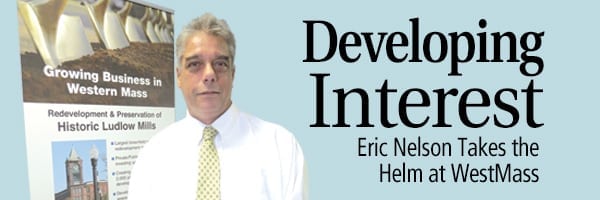
Eric Nelson Takes the Helm at Westmass
Developing Interest
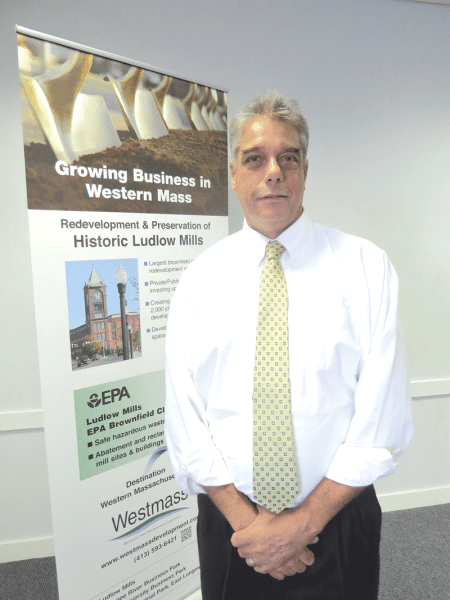
Eric Nelson
As Eric Nelson takes the reins at Westmass Area Development Corp., the agency’s ambitious Ludlow Mills project, which features economic-development opportunities on several levels, is entering an intriguing new stage. Meanwhile, Westmass is moving aggressively to answer the question ‘what’s next?’ — meaning everything from development of new sites to creation of a development-services arm to provide technical assistance to area cities and towns.
While he was pursuing his master’s degree in landscape architecture at UMass Amherst, Eric Nelson developed a keen interest in land planning and economic development, and eventually wrote his thesis on the adaptive reuse of historic mills.
Specifically, his work concentrated on the town of Uxbridge in the Blackstone River Valley south and east of Worcester, and several mills that had drawn the attention of the National Park Service, which would eventually create a national heritage corridor in the area marketed under the slogan “Birthplace of the American Industrial Revolution.”
One of Nelson’s focal points was the famed Stanley Woolen Mill in Uxbridge, which had a long history of manufacturing military uniforms, including those worn by Union soldiers during the Civil War. His work involved making recommendations to the park service on where and how to invest resources for this heritage corridor. It was rather involved work with many key considerations.
“You were looking at factors such as access, transportation, recreation, the integrity of the buildings, the opportunity for tourism, the opportunity for economic development, and much more,” he explained.
Fast-forward 25 years, and Nelson is tackling these very same issues again — this time on a much different stage and with much different stakes.
Indeed, as the recently named president and CEO of Westmass Area Development Corp., Nelson is overseeing a project with striking similarities to what he encountered in Uxbridge — the ongoing efforts to revitalize the Ludlow Mills, which Westmass acquired in 2011.
This initiative blends elements of economic development, which comes in many possible forms, as we’ll see, as well as access and recreation (a riverwalk is being created), and repurposing of a wide array of different buildings on the property.
“There are many similarities between the Blackstone Valley and Ludlow Mills — and a host of other mills in this region,” he explained. “In many instances, they’re on a river, and in a lot of cases, they’re brownfield sites; there are a great many challenges to reuse of these properties.”
But Ludlow Mills is only one piece of the Westmass portfolio, and one aspect of Nelson’s work to increase the agency’s presence in the region and its impact on overall economic development.
There are other properties to be developed, he told BusinessWest, including the Chicopee River Business Park, which has been a lingering source of frustration for Westmass and remains mostly vacant two decades after it opened. But Nelson sees reason for optimism.
“It’s a great location — it’s only two minutes from the Mass Pike, and it’s right off Route 291,” he said, adding that Westmass is considering a change to its strategic focus on the property, with a shift toward attracting potential suppliers to CRRC MA’s subway-car-manufacturing facility, now taking shape less than mile down the road.
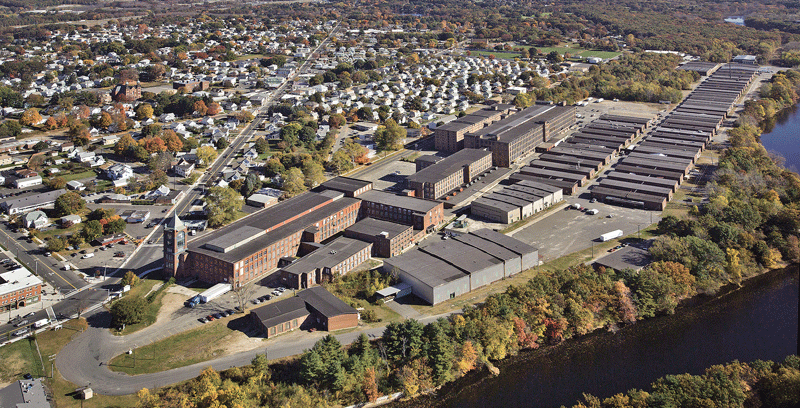
This aerial shot of Ludlow Mills shows the many different elements to this project — from mill redevelopment to river access to green acreage.
Beyond development of its properties, though, Westmass has become more aggressive, if that’s the right word, in efforts to become a resource for other agencies and entities involved in economic development, he noted.
As an example, Nelson cited the ongoing efforts to revitalize the property on Race Street in Holyoke known as the Cubit, because it takes that shape. This project has a number of players, he went on, including the state, the city, Holyoke Community College (which is relocating its culinary arts program there), and private developers. Westmass, and specifically now-former President and CEO Kenn Delude, has been lending technical assistance to bring the initiative together.
“We’re putting together what we call a development-services side of the house,” he explained. “A lot of area towns have resources, but they don’t have the staff; we can be of assistance to them with various development projects.”
For this issue and its focus on commercial real estate, BusinessWest talked at length with Nelson about his vision — for Westmass, Ludlow Mills, the Chicopee River park, and much more, and how he intends to bring it all into focus.
View to the Future
As he talked with BusinessWest in the conference room at the facilities housing Westmass at Westover Metropolitan Airport, Nelson paused to reference a stunning aerial photo of the Ludlow Mills project on one wall.
As he talked, his hand moved over various components of the project — from the land where the new HealthSouth Rehabilitation Hospital of Western Massachusetts now sits (the photo is several years old) to the mill that Winn Development will soon be converting into senior housing; from the so-called Clock Tower building, for which Winn recently announced an ambitious mixed-used project, to the dozens of small block houses, some of which have since been razed; from the intended path of the riverwalk to 47 acres of undeveloped land on the property that constitutes still another key component of the initiative.
The exercise was effective in communicating everything from the importance of the project to the region to what it represents as a career opportunity.
“This is an extremely interesting project with lots of elements and moving parts,” he said. “And it’s significant on many levels — for the town, for the region, for job creation … it’s great to be part of this.”
Nelson, who came to Westmass in 2011 specifically to move the Ludlow Mills project off the drawing board, brings to his new assignment a broad résumé of job experience, with stints in everything from education to landscaping.
He started as a public-school teacher in Amherst, a job he eventually lost to budget cutbacks, and then went into business for himself in landscape construction, specifically the installation of patios, walkways, decks, and other features.
It was that work that eventually took him to UMass and pursuit of his master’s degree. After earning it, he went to work for SVE (Southern Vermont Engineering) Associates, a professional consulting firm specializing in engineering, surveying, and landscape architecture, rising in the ranks to senior project manager and director of the Greenfield office.
He was attracted to Westmass, and a vice president’s position there, specifically by the Ludlow Mills project, which appealed to him on a number of levels, but especially the promise to exercise many of his passions — from landscape architecture to economic development — in one project.
“Westmass was looking for someone to carry the vision out,” he explained. “And the job requirements meshed well with my background, talents, and interests.”
As president and CEO of Westmass, Nelson will see his time and energy parceled in several different directions — geographically and otherwise.
Indeed, the agency owns industrial parks in Agawam, East Longmeadow, and Hadley that are full or mostly full, and Chicopee River, which remains a mostly blank canvas, but one Nelson believes could finally become filled in.
One area has already become home to a solar farm, he explained, and efforts to make a parcel near Route 291 more visible from the highway should generate some momentum.
“I think that will generate a lot of interest because people driving by there don’t realize they can site their building there,” he said of that site work. “And I think that if we can get one company in there, others will follow.”
But Ludlow Mills is getting most of the headlines — and the bulk of Nelson’s attention at the moment.
Winn’s Clock Tower building project comprised the main announcement at the recent Developers Conference staged by the Economic Development Council of Western Mass., and many other components of the project are coming together.
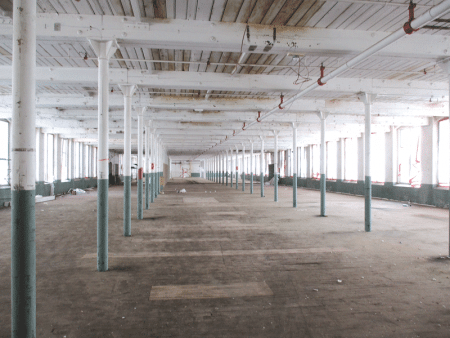
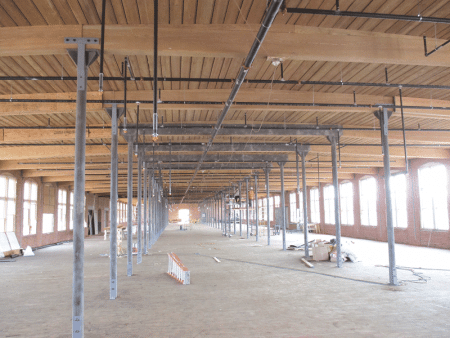
These before-and-after photos show progress being made in the work to convert one of the Ludlow Mills structures into senior housing.
The property is no longer a brownfields site from a technical standpoint — most all contaminants have been remediated — and extensive infrastructure work, including new water and sewer connections, have made the complex far more appealing to developers.
Overall, the site has enormous potential for many different kinds of development, from the senior housing already taking shape to manufacturing, office, and even retail, he explained, adding that, with its various structures and green spaces, it can handle the needs of growing enterprises.
“We have small spaces that startups can rent,” he explained, “and when they get to the point where they need a manufacturing facility, we have the opportunity to offer them a piece of property they can build on.”
Ludlow Mills is roughly five years into a 20-year redevelopment effort, said Nelson, adding that the ongoing challenge is to determine the best uses for various properties moving forward, and facilitating efforts to develop them.
As one example, he returned to the aerial photo and pointed to one of the mills, this one with low (seven-foot) ceilings, which will ultimately make redevelopment quite challenging. Perhaps the best course for that structure is to raze it and create parking for other projects, he explained, adding that this is one of many decisions that will have to be made in the years to come.
Building Blocks
As he talked about Ludlow Mills, Nelson said this project wasn’t yet on ‘auto pilot,’ a phrase he used to describe a point where most pressing issues have been resolved and matters come down to attracting the development community to the property.
But it’s getting close.
And that means more of the agency’s time and energy can be put toward the intriguing question of what comes next.
There are many components to that answer, said Nelson, who started by saying that this region will soon have more inventory of land and properties to develop.
That’s because absorption of existing buildings, a trend (one less expensive than building new) that emerged and then accelerated in the years following the Great Recession, has continued unabated. And that inventory is dwindling.
“The economics of building new were not going to pencil out, because people were able to go buy an existing building at a big discount,” he explained, adding that this fundamental shift in many ways inspired a change in strategies at Westmass, one that prompted a unique project like Ludlow Mills rather than additional industrial-park development.
Go HERE for a listing of available Commercial Real Estate properties for sale and lease in Western Mass.
But if the pendulum isn’t already swinging back, it’s apparent that it soon will, to one extent or another, he went on, adding that, while the green space at Ludlow Mills can address some of the additional demand that will emerge, more land will be needed, for projects of all sizes.
“We’re at a curve in the road,” Nelson explained. “We need to plan ahead, and we need to start aggregating sites and getting sites ready, knowing that it takes three years to get them ready for building.”
He didn’t give any specifics about where the agency is currently looking for land that could be aggregated, but did say the search is on, and, as in years past, it will be undertaken with diligence and imagination.
Meanwhile, another answer to what comes next is that aforementioned development-services arm, which Nelson believes holds vast potential — for Westmass, but especially the region and individual communities.
He circled back to the Cubit project, and Holyoke Community College’s request for Westmass’ support, as an example of what’s possible.
“The leaders at HCC do what they do well — they run a college,” he explained. “But this is not their area of expertise, so they turned to us for help in deciding which building to go into, finding an architect, negotiating a lease, and, more importantly, going for grant funding.
“This meshed well with our skills and talents, and it’s job creation,” he went on, referring to the opportunities awaiting graduates of the culinary arts program. “I see this as a model that Westmass can develop for towns that don’t have staff.”
Milling About
Nelson admits that he pretty much lost track of his master’s thesis subject, the Stanley Woolen Mills. He did some research, though, and reported that progress was being made in redevelopment of those landmarks for new uses.
He has his own project to keep tabs on now, one that is in many ways similar to those Blackstone Valley initiatives, and in all ways important to the future of this region.
What was once a project undertaken in pursuit of a degree is now essentially his life’s work, a project that is well, a textbook example of generating economic-development activity.
George O’Brien can be reached at [email protected]





